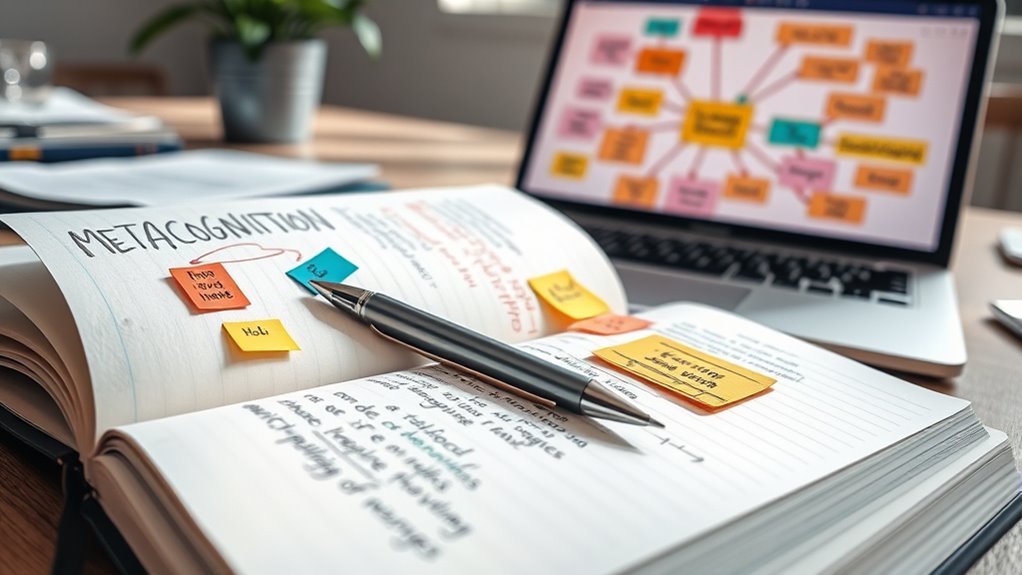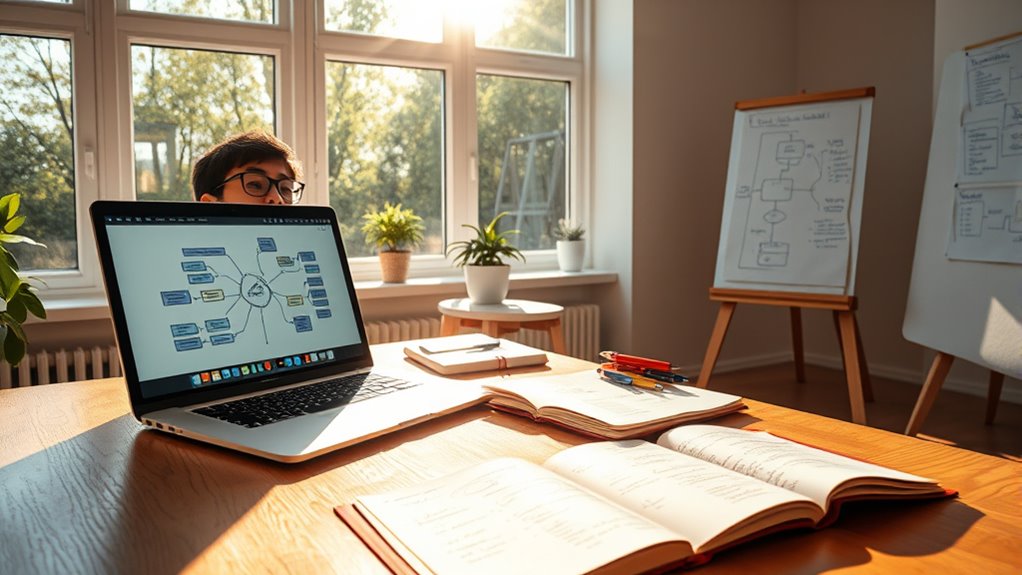To learn skills faster, use metacognitive techniques like evaluating your prior knowledge, setting clear goals, and monitoring your understanding as you go. Reflect on what strategies work best and adjust accordingly. Practice active recall and spaced repetition to strengthen memory. Embrace flexibility by trying new approaches and connecting ideas across areas. Improving self-awareness keeps your learning efficient. Keep exploring these methods, and you’ll discover even more ways to accelerate your progress.
Key Takeaways
- Use pre-study assessments to identify gaps and set clear learning goals.
- Continuously monitor comprehension during learning and adapt strategies as needed.
- Reflect post-study to evaluate what techniques improved understanding and retention.
- Incorporate active recall and spaced repetition to strengthen memory and accelerate skill acquisition.
- Connect new information across disciplines to enhance cognitive flexibility and deepen understanding.

Learning how to learn is an essential skill that can transform the way you acquire knowledge and develop new abilities. When you understand how your brain processes information, you can optimize your study methods and accelerate your learning. Two key concepts that play a pivotal role in this process are memory retention and cognitive flexibility. Mastering these areas allows you to remember information more effectively and adapt to new challenges with ease.
Memory retention is fundamental to learning because it determines how well you can recall and apply information later. Instead of passively reviewing material, you can employ active techniques like spaced repetition and retrieval practice. Spaced repetition involves reviewing content at increasing intervals, which strengthens neural connections and helps move information from short-term to long-term memory. Retrieval practice, on the other hand, encourages you to actively recall facts or concepts, reinforcing your memory and making the information more accessible when needed. By regularly testing yourself, you train your brain to retrieve knowledge more efficiently, reducing forgetfulness and enhancing overall retention. Incorporating memory techniques such as visualization or association can further improve your ability to encode and access information effectively.
Cognitive flexibility, meanwhile, empowers you to adapt your thinking and approach problems from different angles. It involves shifting your perspective and embracing new methods when faced with obstacles or unfamiliar tasks. To develop this skill, challenge yourself to learn new topics or switch between different learning strategies. For example, if you’re used to reading textbooks, try incorporating visual aids or teaching the material to someone else. This flexibility not only keeps your learning interesting but also helps you connect ideas across disciplines, fostering deeper understanding. When your brain remains adaptable, you’re more likely to find innovative solutions and overcome setbacks without frustration.
Incorporating metacognitive techniques into your routine further enhances both memory retention and cognitive flexibility. Before studying, ask yourself what you already know about the subject and set clear goals. During learning, monitor your comprehension and adjust your strategies if things aren’t sticking. Afterward, reflect on what worked well and what could be improved. This self-awareness allows you to fine-tune your approach continuously, making your learning more efficient and tailored to your strengths.
Frequently Asked Questions
How Can I Tailor Metacognition Techniques to My Learning Style?
To tailor metacognition techniques to your learning style, first identify your learning preferences—whether you’re visual, auditory, or kinesthetic. Then, develop personalized strategies that align with these preferences, like using diagrams for visual learners or listening for auditory learners. Regularly reflect on your progress, adjusting methods as needed. This approach helps you maximize your understanding, making your learning process more efficient and engaging.
Are There Specific Tools to Track My Metacognitive Progress?
Think of tracking your progress like steering with a compass. You can use digital journals to record your thoughts, strategies, and reflections, helping you see patterns over time. Progress charts visualize your improvements, making growth visible at a glance. These tools keep you aware of your metacognitive journey, allowing adjustments as needed. With consistent use, you’ll gain clearer insights into your learning process and accelerate your skill development effectively.
How Do I Overcome Procrastination Using Metacognitive Strategies?
To overcome procrastination, you can use metacognitive strategies by improving your time management and boosting motivation. Start by setting clear, achievable goals and breaking tasks into smaller steps to avoid feeling overwhelmed. Use self-monitoring to track your progress and stay accountable. Incorporate motivation boosters like rewarding yourself for completed tasks. Regularly reflect on what’s causing your procrastination, adjusting your approach to stay focused and productive.
Can Metacognition Improve Emotional Resilience During Learning Challenges?
You can boost emotional resilience during learning challenges by using metacognition to improve emotional regulation. By recognizing your emotional responses, you can pause, reflect, and adjust your mindset, fostering resilience. This awareness helps you stay focused and motivated, even when faced with setbacks. Practicing resilience building through metacognitive strategies enables you to manage stress better, bounce back quicker, and develop a stronger, more adaptable approach to learning challenges.
What Are the Common Mistakes to Avoid When Applying These Techniques?
Applying metacognition is like steering through a maze—you need to avoid common pitfalls to reach your goal. Watch out for overconfidence pitfalls, where you might overestimate your understanding and skip essential reflection. A common mistake is neglecting to adapt strategies when they don’t work, leading to frustration. Be mindful of these pitfalls, stay humble, and continuously evaluate your progress to truly benefit from metacognitive techniques and improve your learning process.
Conclusion
By applying metacognition techniques, you can accelerate your learning and master new skills faster. For example, imagine tackling a new language; regularly evaluating your progress and adjusting your strategies guarantees steady improvement. Like a student who uses self-questioning to identify weak spots, you’ll become more aware of your learning process. With consistent reflection and adaptation, you’ll open your full potential, transforming how you learn and grow every day.









